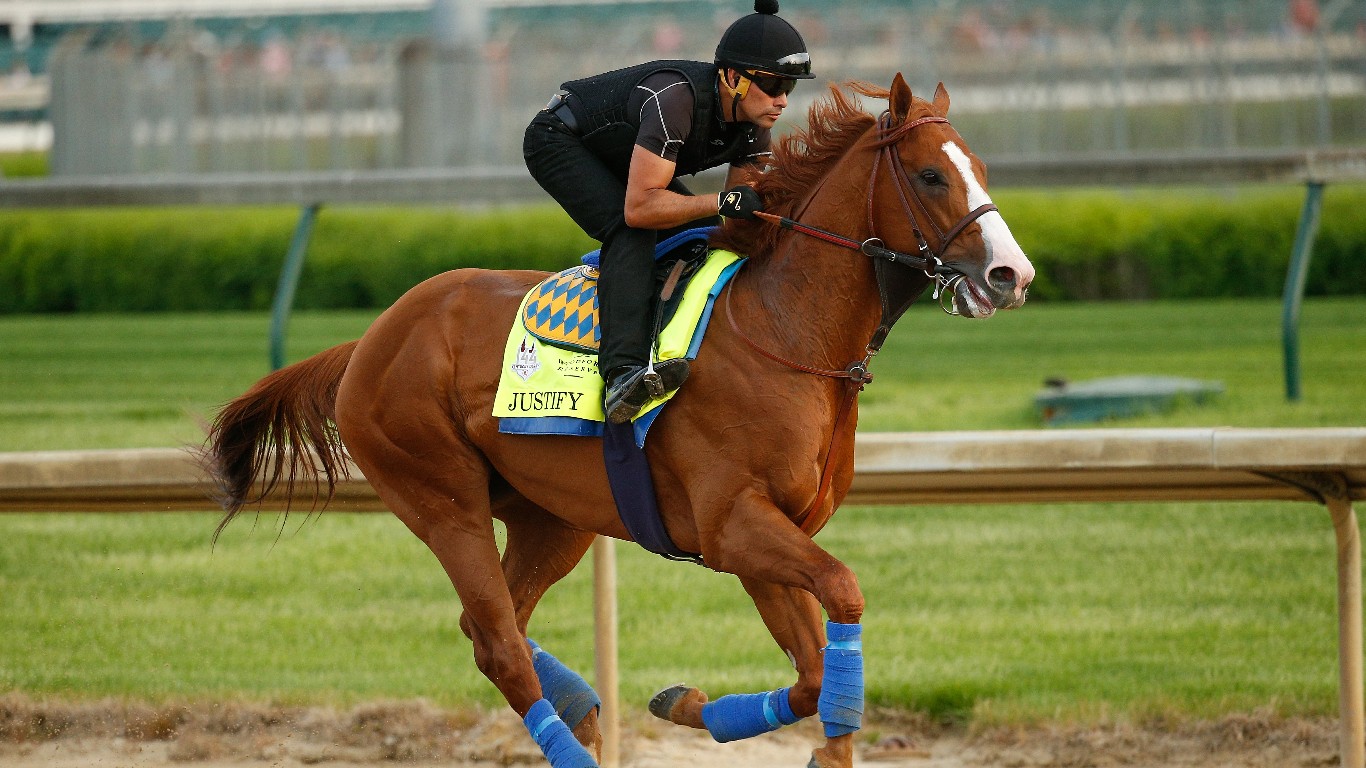
Justify was the last horse to win the Triple Crown, capturing horse-racing’s storied trifecta in 2018. Prior to Justify and before him American Pharoah’s triumph in 2015, the drought between Triple Crown winners had been on unprecedented 37 years, when Affirmed bested Alydar in all three Triple Crown races in 1978. Secretariat ended the longest previous Triple Crown drought of 25 years in 1973 in winning the Belmont by an astonishing 31 lengths.
24/7 Tempo has reviewed the 13 horses that have won the Triple Crown, according to Kentucky Derby’s comprehensive list.
The Belmont, the longest of the three Triple Crown races at 1.5 miles, is considered the true test of champions. Twenty-three times a horse has won the first two legs of the Triple Crown only to be denied horse racing’s ultimate glory by failing to win the Belmont Stakes in New York.
Justify was the overwhelming favorite to cover the Belmont course in first place. The thoroughbred won the 1 3/16-mile Preakness at Pimlico Race Course by holding off Bravazo by a half-length on a muddy track. Two weeks earlier, the chestnut-colored colt won the 1.25-mile Kentucky Derby by 2.5 lengths over Good Magic, also on a sloppy course.
Justify established his dominance right from the start this year by winning his first three races by a combined 19 lengths. Justify was the first colt to win the Derby without racing as 2-year-old in 136 years.
Bob Baffert, who trained American Pharoah, also is the trainer of Justify. Baffert has won 14 Triple Crown races, equaling the all-time total of legendary trainer D. Wayne Lukas.
The Kentucky Derby is one of the nation’s great sports days of the year and the first leg of horse racing’s Triple Crown, followed by the Preakness Stakes in Maryland and the Belmont Stakes in New York. These are the most iconic horses to ever race in the Kentucky Derby.
Click here to see the 13 horses that have won the Triple Crown.
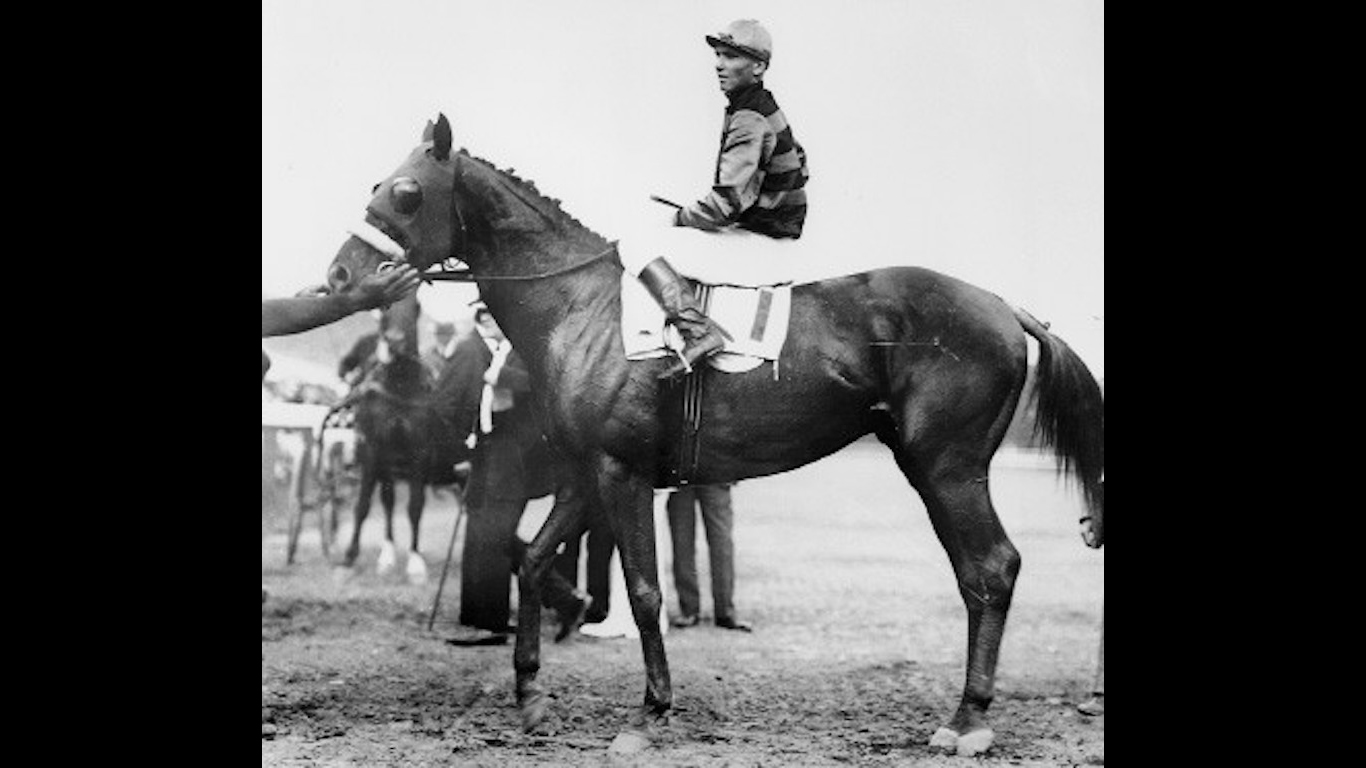
1. Sir Barton
> Won Triple Crown in: 1919
> Trainer: H. Guy Bedwell
> Jockey: John Loftus
Sir Barton was the first to earn the prestigious Triple Crown honor. Right when the thoroughbred turned three in 1919, he competed in the Kentucky Derby and beat the race favorite, Billy Kelly, by an impressive five lengths on a sloppy track. At the Preakness Stakes, Sir Barton led the entire way, beating out competitor Eternal by four lengths. He won the Belmont Stakes by five lengths over Sweep On, setting an American record.
Before Sir Barton turned four, the horse had already been recognized as the best horse of the year and racked up a total of $88,250 in earnings, making him the leading money winner of his time.
[in-text-ad]
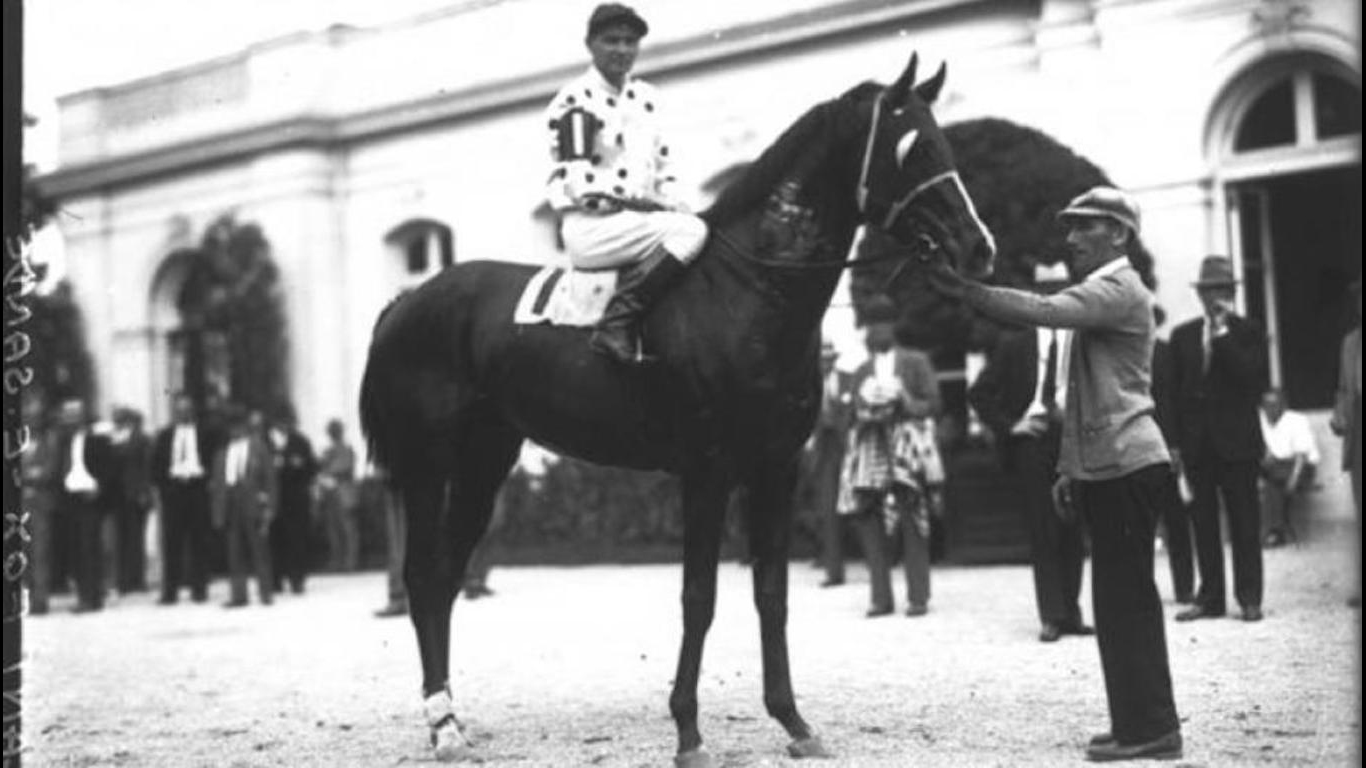
2. Gallant Fox
> Won Triple Crown in: 1930
> Trainer: Jame Fitzsimmons
> Jockey: Earl Sande
Also known as the Fox of Belair, Gallant Fox was the second racehorse in history to win the Triple Crown title. Legendary jockey Earl Sande actually came out of retirement just so he could ride the horse while in its peak shape. In 1930, Fox won the Preakness Stakes, which at the time was scheduled before the Kentucky Derby. The steed went on to win the Derby and the Belmont Stakes.
Gallant Fox kept his winning streak going, finishing first in both the Dwyer Stakes and Arlington Classic, but he was defeated by Jim Dandy on a muddy track at Travers. Fox made a comeback, winning three consecutive races after his defeat. He became the first racehorse to accumulate more than $300,000 in earnings in one year.
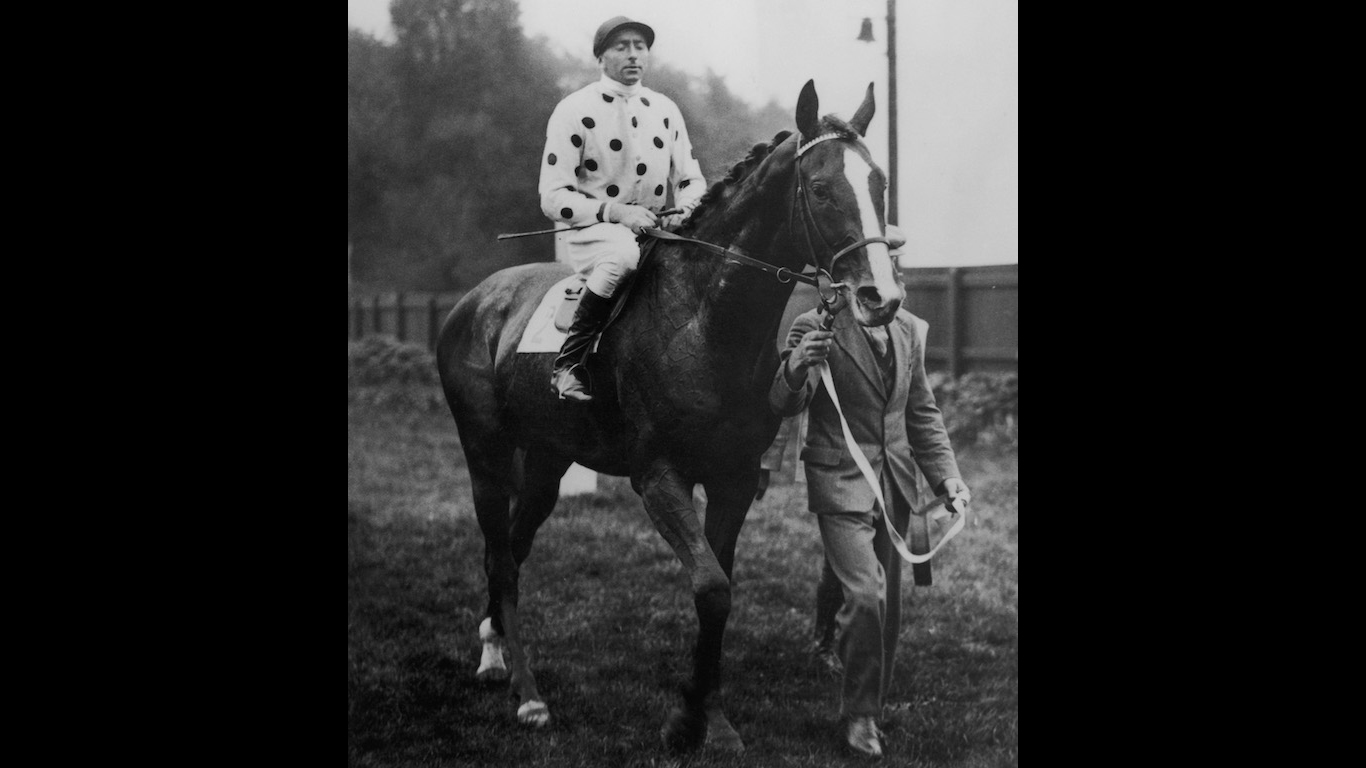
3. Omaha
> Won Triple Crown in: 1935
> Trainer: Jame Fitzsimmons
> Jockey: William Saunders
Omaha was the offspring of former winner of the Triple Crown, Gallant Fox, and they are the only father and son duo to win the Triple Crown. Needless to say, Omaha’s trainer James Fitzsimmons — who had also trained Fox — had high expectations for the racehorse. By 1935, Omaha was expected to finish second at the Kentucky Derby, behind the female horse Nellie Flag, whose parents were both successful racehorses. It was Omaha who came from the outside and took the lead, winning the race by over one length.
Omaha went on to win the Preakness Stakes by six lengths just one week after the Derby. Racing conditions were far from ideal at the 1935 Belmont Stakes, which was Omaha’s final challenge in following his father’s footsteps in acquiring the Triple Crown. The rain-saturated track didn’t thwart Omaha from beating out his biggest competitor, Firethorn, and earning the Triple Crown title.
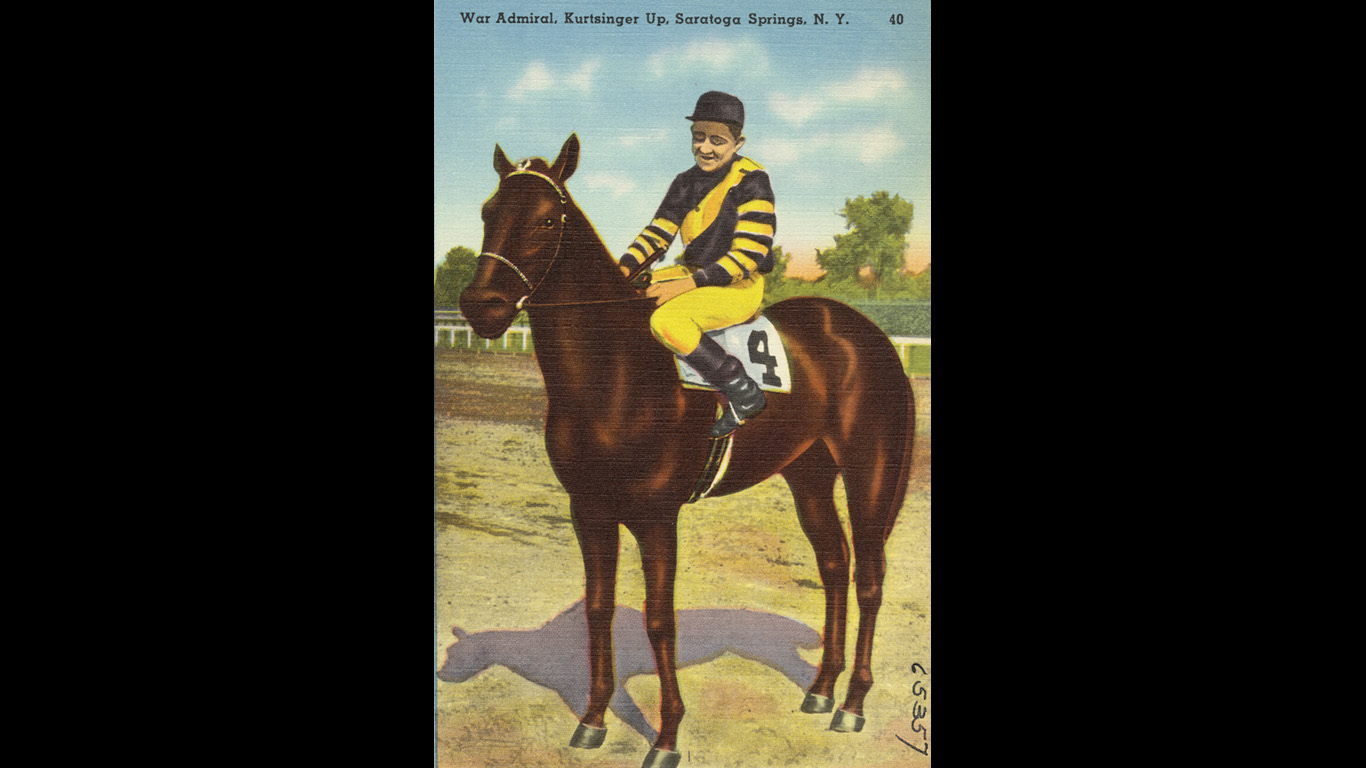
4. War Admiral
> Won Triple Crown in: 1937
> Trainer: George Conway
> Jockey: Charle Kurtsinger
War Admiral was one of the many successful racehorses that was the son of the 1920s superstar horse and Hall of Famer, Man o’ War. For perspective on the kind of genes War Admiral had, Man o’ War was an equine freight train that set many records, including two American records and three world records. Admiral may not have been as big in size as his father, but his innate talent and disposition were enough to win him the Kentucky Derby, a race Man o’ War never competed in. To say this racehorse was tenacious is an understatement.
Admiral injured himself just minutes before the start of the Belmont, the final leg of the Triple Crown. The horse slashed his right forefoot while acting out in the starting gate, but he still won the race by three lengths.
[in-text-ad-2]

5. Whirlaway
> Won Triple Crown in: 1941
> Trainer: Ben A. Jones
> Jockey: Eddie Arcaro
The fifth horse to win the Triple Crown, Whirlaway, was a difficult horse to train. In the early stages of coaching, trainer Ben Jones had to design a blinker device so that Whirlaway wouldn’t bolt to the outside rail of the racetrack. The horse’s behavior was so unpredictable, some even described it as bratty, that jockey Eddie Arcaro evidently never looked forward to riding Whirlaway. However, Arcaro — like many horse-racing fans in the early 1940s — anticipated the results.
Besides winning the Triple Crown in 1941, the strong-willed steed reached the winner’s circle for the Travers, American Derby, Dwyer, Saranac, and Lawrence Realization races.
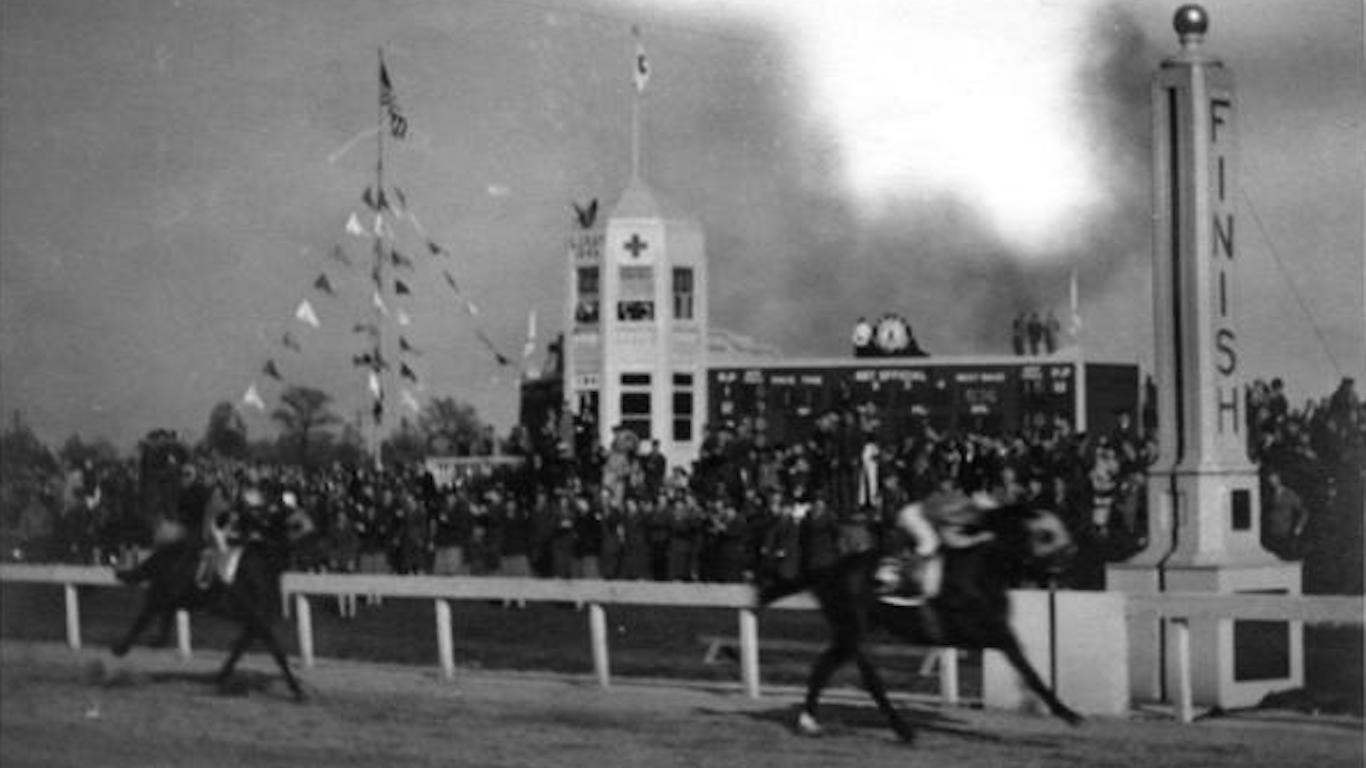
6. Count Fleet
> Won Triple Crown in: 1943
> Trainer: G. D. Cameron
> Jockey: John Longden
The famed Count Fleet is the offspring of 1928 Kentucky Derby champion, Reigh Count. Count Fleet was bred and owned by Fannie Hertz, wife of John D. Hertz, who founded the Hertz rental car company. Hertz had been keen on selling the horse, but Fleet’s jockey John Longden persuaded him to keep the thoroughbred. This push by Longden was a smart move considering Fleet found success early on in his career, earning $76,245 in prize money in his juvenile season alone.
By the age of three, Count Fleet was unstoppable. He won the Derby by three lengths, the Preakness by eight, and then dominated the field at the Belmont by finishing in an impressive 25 lengths ahead of the runner-up. Count Fleet became the sixth Triple Crown champion and sired nearly 40 foals that became stakes winners.
[in-text-ad]

7. Assault
> Won Triple Crown in: 1946
> Trainer: Max Hirsch
> Jockey: Warren Mehrtens
Just three years after Count Fleet became the sixth Triple Crown winner, Assault galloped into the spotlight as the next Triple Crown champion. Similar to Count Fleet, Assault was the offspring of a former Kentucky Derby champion. Assault’s father, Bold Venture, won the 1936 Kentucky Derby. However, trainer Max Hirsch did not have high hopes for Assault. The colt received the nickname “The Club Footed Comet” after stepping on a surveyor’s stake and crippling himself. Hirsch and those betting on Assault were pleasantly surprised when this partially disabled steed won the August 5 Flash Stakes with starting odds of 70 to 1.
Assault went on to win the Triple Crown in 1946, but he received backlash for posting unremarkable times at each race. At the time, the public wrote him off as the best horse in a poor pool of three-year-olds.
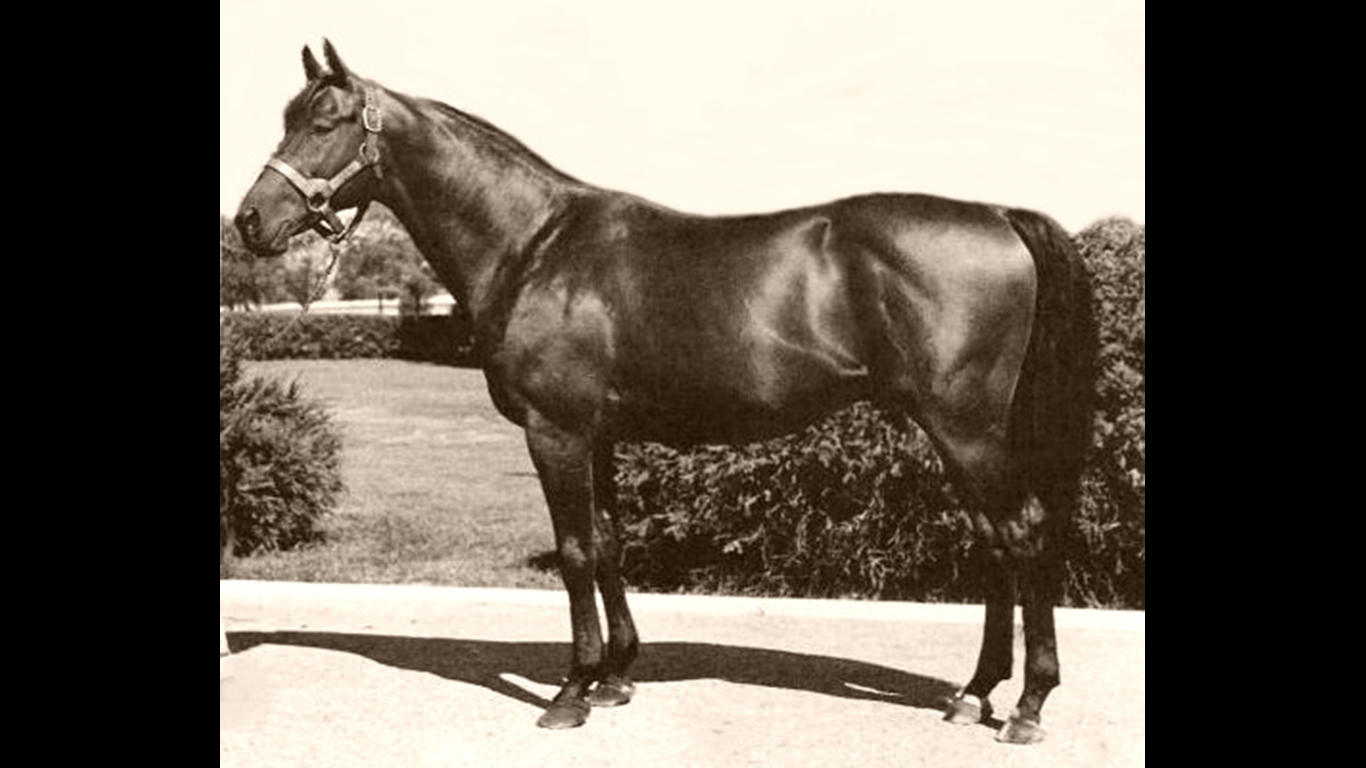
8. Citation
> Won Triple Crown in: 1948
> Trainer: Ben A. Jones
> Jockey: Eddie Arcaro
Citation is the fourth racehorse of the 1940s to earn the Triple Crown title — and the last to earn it until 1973. Even though Citation’s claim to fame at the time stemmed from his Triple Crown win, he is more well-known today for breaking another kind of record. Citation was the first racehorse in history to win a total of over $1 million in his 45-race career.
Citation competed from 1947 to 1951, winning 32 times and only finishing out of the money once. In his peak, Citation had seven consecutive wins leading up to the Triple Crown in 1948. Unfortunately, Citation’s devoted jockey, Al Snider, did not get to join the steed in the remainder of his triumphant career. Snider drowned on a fishing trip off the Florida Keys just a few months before Citation began his quest for the Triple Crown. Trainer Ben Jones, also known as Jimmy, asked Eddie Arcaro to ride Citation in the 1948 Kentucky Derby. Arcaro, who was the jockey for the 1941 Triple Crown champion Whirlaway, led Citation to victory in all three races.

9. Secretariat
> Won Triple Crown in: 1973
> Trainer: Lucien Laurin
> Jockey: Ron Turcotte
Also known as Big Red, Secretariat may be the greatest race horse ever to compete. The 1973 Kentucky Derby Race goes down in history as one of the most exciting races of all time. During the race, Secretariat pulled ahead of his competitor Sham to break the two-minute barrier, finishing 2.5 lengths ahead of Sham in a time of 1:59.40, a Derby record that still stands. Sham was arguably the race favorite, having defeated Secretariat in the Wood Memorial race just a few weeks prior.
Secretariat’s racing career lasted for 16 months, in which the horse competed in 21 races. The talented horse may not have gone undefeated, but that achievement would have lacked in comparison to his record-shattering wins at both the Kentucky Derby and Belmont Stakes. Secretariat won the 1.5-mile race at Belmont in a time of 2:24, a full 31 lengths ahead of the runner-up. Secretariat, who ended the 25-year Triple Crown drought, remains one of the most idolized horses today.
[in-text-ad-2]

10. Seattle Slew
> Won Triple Crown in: 1977
> Trainer: William H. Turner, Jr.
> Jockey: Jean Cruguet
Seattle Slew is the first winner of the Triple Crown to have gone undefeated prior to the Triple Crown races. And there’s a reason this horse went 9-for-9. In the 1977 Kentucky Derby race, Seattle Slew outpaced his opponent For The Moment on the final stretch to the finish line.
About half way through the race, For The Moment’s jockey, Angel Cordero peered to the side and saw Slew’s head bobbing up beside his boot. He was astonished and nearly frightened when he noticed it was not For The Moment he was looking at, but directly at Cordero. Slew’s trainer William H. Turner, Jr. feared that the ruthless Slew would be so competitive he’d have the audacity to grab onto a rider’s leg and yank him off his horse.

11. Affirmed
> Won Triple Crown in: 1978
> Trainer: Lazaro Barrera
> Jockey: Steve Cauthen
Before American Pharoah claimed the Triple Crown title in 2015, Affirmed was the last horse to win it, 37 years earlier. Affirmed won the Kentucky Derby, Preakness, and Belmont Stakes in 1978. The chestnut-colored beauty was retired the following season, with 14 stakes race wins under his belt and more than $2.3 million in prize money.
Affirmed had gone head-to-head with the runner-up of the Belmont, Alydar, in a total of 10 races. In seven of the 10, Affirmed came out as the winner. The horses’ 10th and final meeting was at the Saratoga Travers Stakes, and Alydar didn’t go down without a fight. Alydar seemingly challenged Affirmed by moving to the rail but fell short when Affirmed cut him off, almost causing him to collapse. Affirmed surged ahead to win the race. However, he was disqualified for the infamous cut-off.
[in-text-ad]
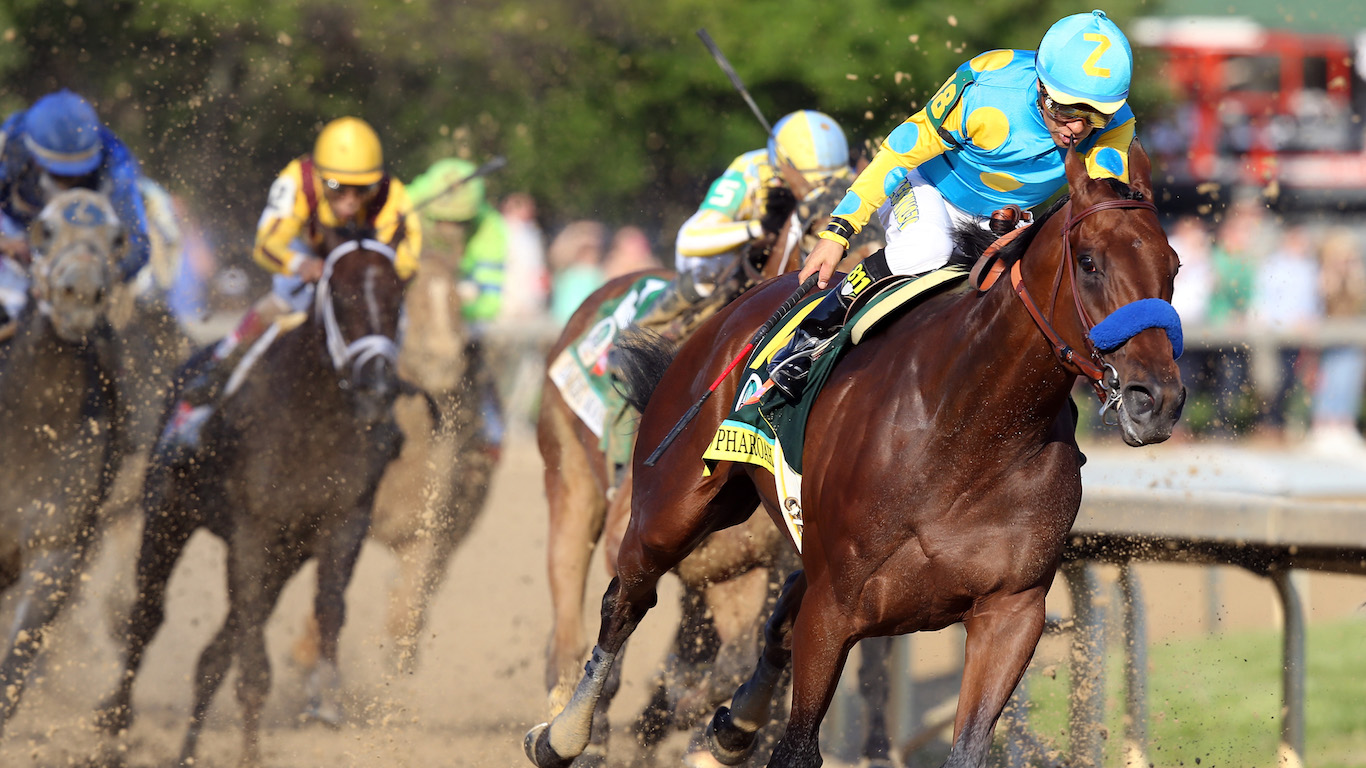
12. American Pharoah
> Won Triple Crown in: 2015
> Trainer: Bob Baffert
> Jockey: Victor Espinoza
American Pharoah ended the 37-year drought for the Triple Crown — the last to win it was Affirmed in 1978. His Triple Crown win racked up more than $8 million in prize money. The stallion didn’t stop racing after the monumental win. He finished out the season in the fall of 2015 with another win at the Breeders’ Cup Classic. By winning that race and the Triple Crown, American Pharoah won horse-racing’s inaugural Grand Slam.
Like most horses with such accolades, American Pharoah’s offspring sold for a hefty chunk of change. One of the steed’s female foals sold for a whopping $1 million. One of his male foals sold for a little over half a million dollars, and another offspring sold for as much as $375,000.

13. Justify
> Won Triple Crown in: 2018
> Trainer: Bob Baffert
> Jockey: Mike E. Smith
The most recent horse to win the Triple Crown is Justify, who won it in 2018. He was the favorite since winning the first of the three famed races — the Kentucky Derby. The racehorse as the first to win the Derby since 1882 without racing as a 2-year-old. The stallion’s nickname at the barn was “Big Red.” Justify won the Belmont Stakes race, and ultimately the Triple Crown, in 2:28.18, well off the record time of 2:24, run by Secretariat in 1973.
The Average American Is Losing Momentum On Their Savings Every Day (Sponsor)
If you’re like many Americans and keep your money ‘safe’ in a checking or savings account, think again. The average yield on a savings account is a paltry .4%1 today. Checking accounts are even worse.
But there is good news. To win qualified customers, some accounts are paying more than 7x the national average. That’s an incredible way to keep your money safe and earn more at the same time. Our top pick for high yield savings accounts includes other benefits as well. You can earn up to 4.00% with a Checking & Savings Account today Sign up and get up to $300 with direct deposit. No account fees. FDIC Insured.
Click here to see how much more you could be earning on your savings today. It takes just a few minutes to open an account to make your money work for you.
Thank you for reading! Have some feedback for us?
Contact the 24/7 Wall St. editorial team.
 24/7 Wall St.
24/7 Wall St. 24/7 Wall St.
24/7 Wall St.